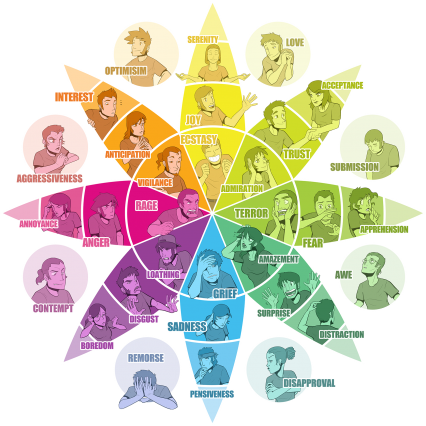Treating emotions as signs from God brings about a few questions. First of all, can you treat all emotions as signs of God? Sometimes our emotions direct us away from Him, sometimes they trigger us to obey our desires and trespass the borders of the licit. Nevertheless, in certain cases, emotions show us God's path! How to know, what to do?
All this tells us that the emotions are part of our journey to God, but we haven't resolved our problem at the outset. How can we distinguish the underlying motive of our emotions? Are they Godly or are they carnal?
Let's go step by step. If your emotions are directing you towards an action that is clearly forbidden by God, this is a clear misdirection disguised in your emotions. But is this it? I mean, you need only to disregard that emotion, and go on with your life? No, stop. Of course committing an action that is forbidden by God is wrong, but your emotions may carry a message, a Godly message, that may feel otherwise at first glance!
It is possible that your emotions are pointing at the essential needs of your psyche or of your body, which must be met through the licit, but which you haven't done so for various reasons. In such a case, your body or your psyche is going to show increasingly compelling urges and emotions to meet that essential need, and as the owner of this body and soul, you are responsible to take care of their needs. If you don't, even if you manage to keep yourself from trespassing the limits of God in this world, you are clearly going to be held accountable for what you did to your body and soul. So, instead of oppressing yourself, you must decipher the embedded message of your emotions and act accordingly as soon as possible.
“He will show you His signs, and you will recognize them” (27/93).
“We will show them Our signs in the horizons and within themselves until it becomes clear to them that it is the truth” (41/53).Remember, after an event, what makes you feel like "you have witnessed God" is the emotions that are triggered during that event. So, without emotions, the signs don't make sense. So, if God is going to show His signs to a people whether in the horizons or within themselves, this means emotions are at work. That is the emotions are employed by God to create the effect of "having witnessed". Then, knowingly or unknowingly, when a person blinds himself towards his emotions, he is closing the windows through which God's light shines. In this context, forgetting God and becoming ignorant of one's self merge.
And be not like those who forgot Allah, so He made them forget themselves. Those are the defiantly disobedient. (59/19)Furthermore, in this framework, deliberately silencing your emotions or emotions of others using various means, e.g. psychological or rhetorical, is an action that is identical with disbelief, because you are becoming blind towards God's signs and deaf towards His messages.
And those who disbelieve in God's signs and the encounter with Him -- they despair of My mercy, and there awaits them a painful chastisement. (29/23)
Now then has come unto you a clear (sign) from your Lord,- and a guide and a mercy: then who could do more wrong than one who rejects Allah's signs, and turns away therefrom? (6/157)
All this tells us that the emotions are part of our journey to God, but we haven't resolved our problem at the outset. How can we distinguish the underlying motive of our emotions? Are they Godly or are they carnal?
Let's go step by step. If your emotions are directing you towards an action that is clearly forbidden by God, this is a clear misdirection disguised in your emotions. But is this it? I mean, you need only to disregard that emotion, and go on with your life? No, stop. Of course committing an action that is forbidden by God is wrong, but your emotions may carry a message, a Godly message, that may feel otherwise at first glance!
It is possible that your emotions are pointing at the essential needs of your psyche or of your body, which must be met through the licit, but which you haven't done so for various reasons. In such a case, your body or your psyche is going to show increasingly compelling urges and emotions to meet that essential need, and as the owner of this body and soul, you are responsible to take care of their needs. If you don't, even if you manage to keep yourself from trespassing the limits of God in this world, you are clearly going to be held accountable for what you did to your body and soul. So, instead of oppressing yourself, you must decipher the embedded message of your emotions and act accordingly as soon as possible.
Say: "O my Servants who have transgressed against their souls! Despair not of the Mercy of Allah: for Allah forgives all sins: for He is Oft-Forgiving, Most Merciful. Turn in repentance to your Lord and submit to His will before you are afflicted with the torment after which you can receive no help. (39/53-54)
And those who when they commit an indecency or do injustice to their souls remember Allah and ask forgiveness for their faults-- and who forgives the faults but Allah, and (who) do not knowingly persist in what they have done. (3/135)
Along the same lines, it is also possible that you are misinterpreting your emotions due to the cultural biases and prejudices that are wrong in the face of the creation, but which survived due to the bigotry of the people (e.g. read benefits of sins). In this case, your emotions may seem like they are motivating you to do evil in your perception when, in fact, they are guiding you towards the proper path of life intended by God.
When it is said to them: "Follow what Allah has sent down." They say: "Nay! We shall follow what we found our fathers following." (Would they do that!) Even though their fathers did not understand anything nor were they guided? (2/170)
A compounded case of misdiagnosing and mistreating the emotions happens when you try to do exactly what is described above. Let's say, for some reason, you did not meet the needs of your body or psyche, i.e. material or mental needs, and your emotions directed you towards meeting them. At this point, either you fall into the hands of your urges and commit something that you would otherwise not or you treat these emotions of yours as disguised messages and try to understand and pursue those embedded messages. In both cases, you find yourself doing things that feel awkward! This feeling, let's call it an emotion of alarm, bangs to your head and you understand (!) that this was all Devil's plot against you, and you committed a sin, and you should never ever have quit the safe ground of yours, as you had done until before that action. While in this state, you become more attentive to the negative aspects of what happens around you, and you deem that "all of these adversities are signs from God for you to return". So, you take a 180 degree turn and stick your head into the same life style where you continue oppressing yourself with an intention to please God.
Before delving into the above case, let's see what the modern science says about emotions: forecasts of our brain of what is coming ahead. So, our brain is programmed to prepare us for future events in order to protect us. Now, our brain makes those forecasts based on past experiences or on learned material, including what has been ingrained in our minds culturally. Accordingly, a malformed mentality is going to prepare the grounds for the burgeoning of wrong emotions and wrong interpretations of the events due to those wrong emotions!
As you can see, you can not normally get out of this vicious cycle unless and until you take an action that truly feels awkward and you continue doing that until it doesn't anymore feel awkward, even if those around you try to turn you back. This kind of willful action necessitates firm ties with the Book of God, because you are trying to find what is truly pleasing to God and because you are intending to leave everything and everyone behind. A miscalculation in this regard means suicide! How can you be sure that what you are doing is the thing to do?
The answer: you can not be sure! The only sure thing you can be is your sincerity towards God. You trust that your Lord is going to guide you towards His ways for the sake of your sincere intentions. So, you submit to your Merciful and Wise Guide, which is the true meaning of being a Muslim, i.e. one who has submitted:
And (as for) those who strive hard for Us, We will most certainly guide them in Our ways; and Allah is most surely with the doers of good. (29/69)
An event that contains all of these was lived during the life of the Prophet Muhammad pbuh. One day, one of the companions approached the prophet complaining about himself: "I feel an urge for fornication". Although those around were appalled by the daring revelation by this person, the messenger of God, first, convinced him of the wrongness of adultery:
- Would you like this to be done to your mother?
- No!
- Know that the person you are doing adultery with is the mother of someone.
- Would you like this to be done to your sister?
- No!
- Know that the person you are doing adultery with is the sister of someone.
Having convinced this man, Muhammad pbuh places his hand on the man's chest and prays for him to recover from this state. Finally, he marries the man to a woman. Later, the man becomes one the most chaste people of his time. (Musnad Ahmad, 21708)
Isn't it normal for a man to feel an urge to satisfy his lust, especially if he is not married? I am not defending adultery nor placing the male's needs above everything else, as you may think as a person of today, but I am trying to make a point: if a person's biological, psychological or mental needs are not met, they are going to feel an irresistible urge to satisfy those needs. And this urge, in itself, is not necessarily evil. It is a guidance to you by the Creator in order for you to establish justice in your body that is entrusted to you.
Isn't it normal for a man to feel an urge to satisfy his lust, especially if he is not married? I am not defending adultery nor placing the male's needs above everything else, as you may think as a person of today, but I am trying to make a point: if a person's biological, psychological or mental needs are not met, they are going to feel an irresistible urge to satisfy those needs. And this urge, in itself, is not necessarily evil. It is a guidance to you by the Creator in order for you to establish justice in your body that is entrusted to you.














